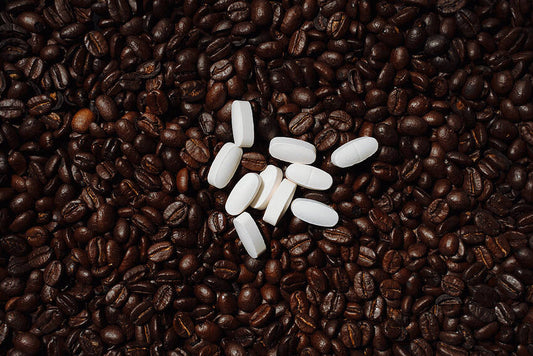What Is Caffeine?
Caffeine is the world's most widely used drug. When we consider the word ‘drug’ this might stir a few thoughts, positive and possibly negative, surrounding the use of caffeine...
How effective is it?
What makes it different from other supplements?
Are there any side effects or long-term health consequences?
In this article we will discuss what caffeine is, how it works, when and in what doses it may be effective, and perhaps when we might want to give it a miss, even if we are used to consuming large amounts of this glorious brown liquid.
But what is ‘caffeine’... Caffeine is found in its natural form in coffee and teas, as well as extracts which can be added to supplements and drinks.
A synthetic version (caffeine anhydrous) is often added to energy drinks and other stimulant supplements.
The amount of caffeine found in coffee beans can vary MASSIVELY.. Even the same drink from the same coffee shop on different days can have a significantly different caffeine content. Therefore, sports supplements tend to use synthetic forms as they are much more easily dosed.
Caffeine's chemical name is 1,3,7-trimethylxanthine. This means it is a ‘xanthine molecule’, with a methyl group attached to the 1st, 3rd and 7th carbons. Other stimulants including theophylline and theobromine have this xanthine ‘backbone’.

How Does Caffeine Work?
Xanthine is one of the ‘base’ molecules in the body and is found in many tissues. It is the addition of the methyl groups, creating caffeine, that makes it a stimulant.
Caffeine binds to receptors in the body causing its effects. The receptors caffeine binds to in the brain are called adenosine receptors.
Under normal circumstances adenosine receptors are signalled by adenosine, which is greeted in increasing amounts as a natural result of energy metabolism in the brain, that signals feelings of tiredness and fatigue.
It may seem paradoxical that caffeine, if binding to these same receptors causes the opposite effects. This is because caffeine doesn’t actually fully activate the receptors, instead it simply blocks adenosine binding to it, thus preventing fatigue.
However, through these adenosine receptors but through different processes, caffeine also acts in a stimulatory way to give us a caffeine buzz and mood boost!
Caffeine may also stimulate the release of adrenaline. This then causes effects including increased heart rate, fat utilisation, glycogen breakdown and several other processes involved in energy metabolism and regulation of fluid balance.
It is these adrenaline effects that may explain why certain people get an uncomfortable increase in heart rate and feelings of anxiety on caffeine, especially if they are caffeine naïve and consume a large amount!
What Sports And Activities Is Caffeine Good For?
The real beauty of caffeine for sports is that for pretty much all sports it has evidence to show benefits in performance.
Because of the wide-ranging effects of adenosine receptors in the brain along with the role of adrenaline in energy metabolism, heart, and muscle function, caffeine has shown solid evidence for almost every type of sport from endurance to strength training.
Typically speaking, lower doses are recommended to keep fatigue at bay during endurance sports and activities. Higher doses and the larger stimulant effect seem to be more beneficial in strength and power sports.
How Should You Use Caffeine?
Caffeine enters the body within an hour, and within 2 hours is reaching peak levels, so consuming caffeine around that time before exercise is the best approach to take. Caffeine's half-life is typically around 4-5 hours but can vary wildly depending on the individual.
The half-life of a substance is the amount of time for the body to ‘use’ half of the substance. So, if we look at the consumed 100mg of caffeine, after 5 hours there would be 50mg of caffeine floating about in your body, and then after another 5 hours (totalling 10 hours) there would be around 25mg left!
This is why both the timing and dose of caffeine ingestion before bed is important to make sure there isn’t enough floating around in the body keeping us awake… give yourself at least 8 hours before bed to make sure you will not disturb your sleep!
Recommendations for caffeine range from between 2-6mg per kg of bodyweight. For those who have never consumed much caffeine, then it is always sensible to start with lower doses.
For context, an americano coffee from your favourite high street coffee house can contain around 250mg of caffeine… but remember this can vary wildly… for a 70kg person this could be over 3mg/kg!
The active dose of caffeine is highly individual and has been noted to have effects in some people with as little as 10mg! So, as you can see if we consume too much caffeine in one hit, it may take several hours to drop below a level that isn’t having an impact.
This is why caffeine is something we should start with in small doses of less than 100mg to assess tolerance and then build up over time once we have tested the impact and duration of its effects!
When Shouldn’t I Use Caffeine?
For some people who have anxiety or worries about heart health, then the effects of caffeine on adrenal response can cause panic, although are unlikely to be directly harmful.
Avoiding caffeine altogether may not be necessary but certainly jumping in at the deep end with high strength caffeine supplements is probably not recommended.
We may also develop tolerance to the stimulant (but not anti-fatigue) effects of caffeine.
For those who are looking for a ‘buzz’ to help performance, then cycling caffeine around periods of peak training/performance is probably a good idea. Then, take a couple of weeks break when effects start to diminish.
Summary
Caffeine is an effective performance and cognitive boosting supplement that is effective in many types of sports and activities.
Coffee is the most commonly consumed form, however doses between coffee beans can vary wildly, so dosing accurately can be difficult.
Caffeine supplements and pre-workouts are more accurately dosed, but can be higher strength so these need to be used according to your individual response and it is important to start on the lower end of the recommendations for those who are ‘caffeine naïve’.
The effects of caffeine can last several hours, even if we can’t ‘feel’ it. Therefore, we need to be careful on the amount and timing of caffeine to make sure we can get to sleep on time!
References
- J J Salinero et al. Effects of acute ingestion of caffeine on team sports performance: a systematic review and meta-analysis. Research in Sports Medicine, An International Journal, Volume 27, 2019 - Issue 2.
- Kyle Southward, Kay J. Rutherfurd-Markwick & Ajmol Ali, The Effect of Acute Caffeine Ingestion on Endurance Performance: A Systematic Review and Meta–Analysis. Sports Medicine volume 48, pages 1913–1928(2018)
- J Grgic et al. ADORA2A C Allele Carriers Exhibit Ergogenic Responses to Caffeine Supplementation. Nutrients 2020, 12(3), 741;
- C Pickering & J Kiely. Are the Current Guidelines on Caffeine Use in Sport Optimal for Everyone? Inter-individual Variation in Caffeine Ergogenicity, and a Move Towards Personalised Sports Nutrition. Sports Medicine volume 48, pages7–16 (2018)















